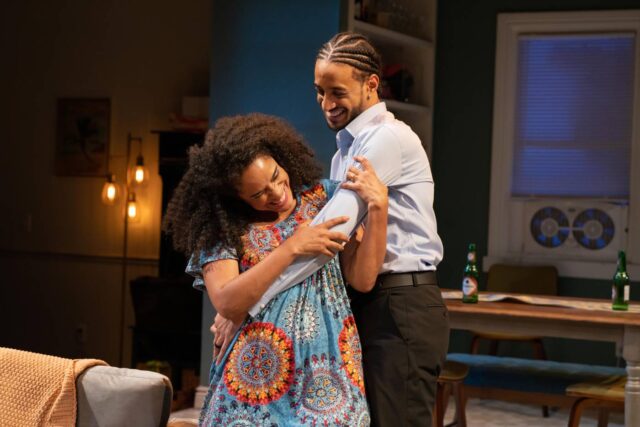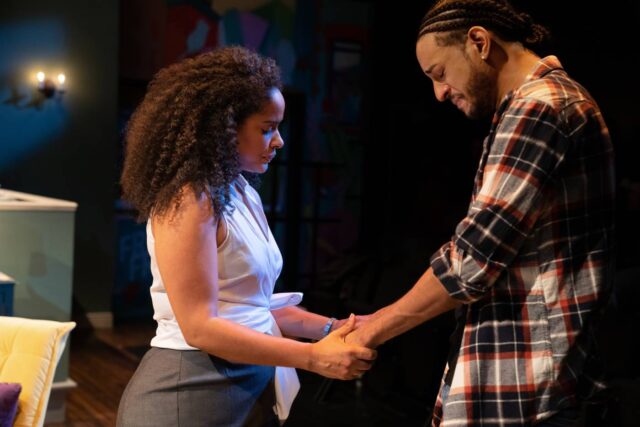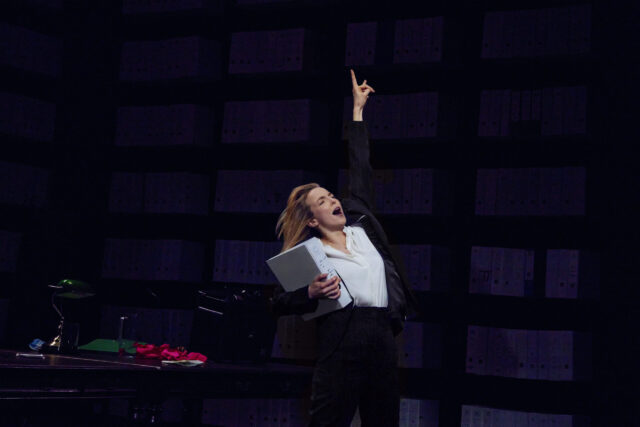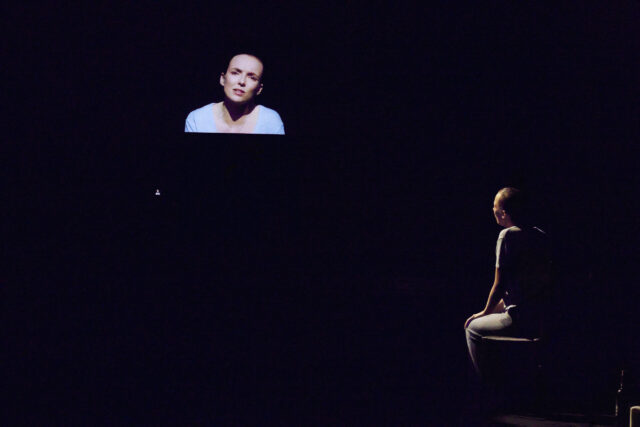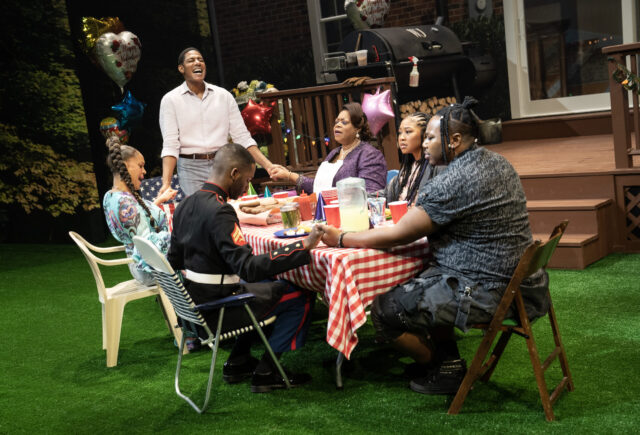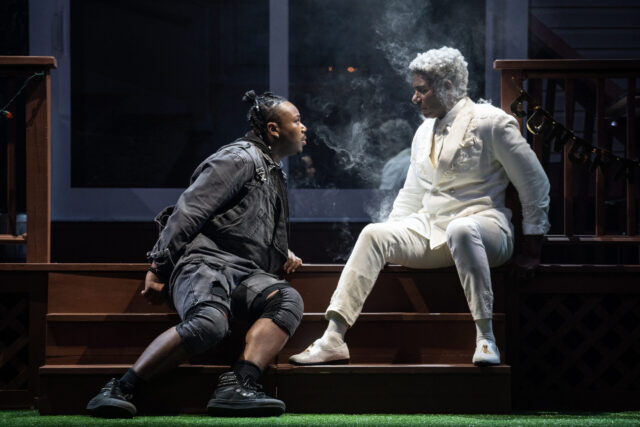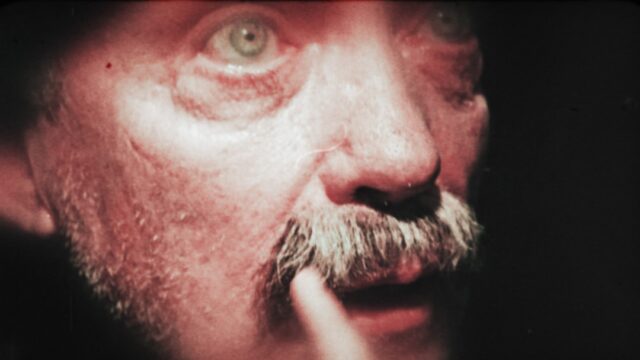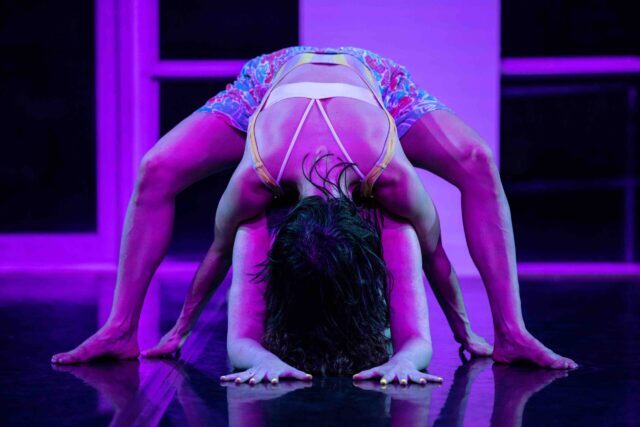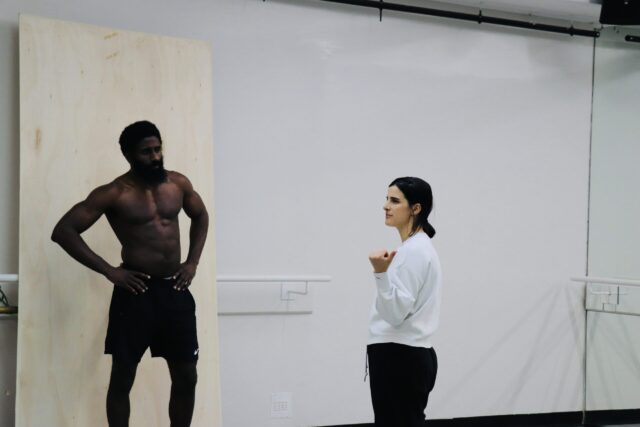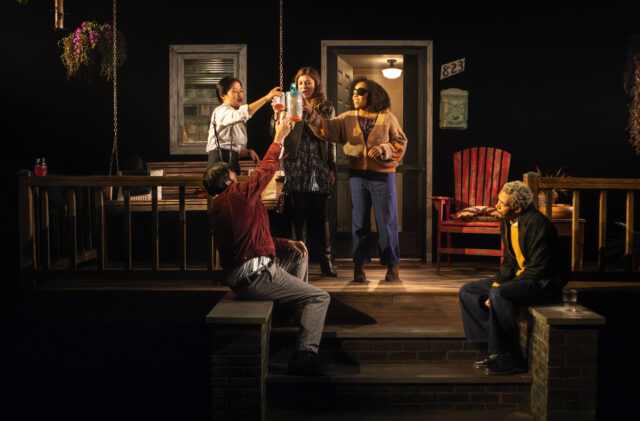
Old friends gather for a pre-reunion reunion in Branden Jacobs-Jenkins’s The Comeuppance (photo by Monique Carboni)
THE COMEUPPANCE
The Alice Griffin Jewel Box Theatre
The Pershing Square Signature Center
480 West Forty-Second St. between Tenth & Eleventh Aves.
Tuesday – Sunday through July 9, $49-$159
thecomeuppance.net/info
At the end of Branden Jacobs-Jenkins’s The Comeuppance, making its world premiere at the Signature, there were tears in my eyes. I wasn’t sobbing because of something that had happened in the plot or to any specific character but because of how brilliant the play is; its sheer beauty, from the writing and staging to the acting and directing, simply overwhelmed me, and I needed time to gather myself before heading home.
The Comeuppance is a fiercely intelligent, diverse revision of the Breakfast Club for the twenty-first century, an alternate version of the Athlete, the Brain, the Criminal, the Princess, and the Basket Case looking back at their lives two decades later and not necessarily liking what they see. A small band of high school friends have gathered for a pre-reunion twentieth reunion — Emilio (Caleb Eberhardt), an ex-pat artist living in Berlin returning to the US with a piece in the Whitney Biennial; Caitlin (Susannah Flood), the smartest student in school, who married an older man with two kids; Kristina (Shannon Tyo), a military doctor with five children; and Ursula (Brittany Bradford), the host of the party who spent years taking care of her elderly grandmother and now lives alone in her grandmother’s house. As the characters slowly congregate on Ursula’s porch, they reveal hints about their past and foreshadowings of the future. The simmering conflicts are ignited when Kristina surprises everyone by bringing along Paco (Bobby Moreno), whose traumatic five tours of duty in the Marines have left him heavily medicated, which does not stop his boisterousness.
The acerbic and direct Emilio makes his displeasure known, arguing that Paco was not in the same class with them and was not a member of their outsider “gang,” M.E.R.G.E., which stands for Multi-Ethnic Reject Group. “Does that spell ‘Merge’ or ‘Merg?’” Paco asks. “It’s a soft G,” Emilio, Ursula, and Kristina quickly bark out in unison. Kristina claims that Paco was an associate member because he was dating Caitlin, but that explanation doesn’t satisfy Emilio, who starts alluding to an incident that occurred between the couple. Meanwhile, Ursula, who has recently lost an eye so has difficulty with depth perception, is adamant that she will not be going to the reunion, and they are all upset that Simon has just canceled via text message. They also debate whether it is a good idea to arrive in a limo, which Kristina ordered, further establishing that the reunion has a different meaning for each of them.
“In high school, every stupid prom, every homecoming, we were always randomly showing up in a limo like somehow it was a thing that people did in real life,” Emilio says. “But we’re not teenagers anymore. Now we’re just adults showing up in a limo,” Caitlin contends. “But isn’t the point of this dumb event reliving high school for the night? I think people will think it’s funny. Maybe it is a little conceptual,” Emilio replies. Caitlin: “‘Conceptual?’ What does that mean?” Emilio: “Don’t worry about it. Listen: It’s just a little nostalgia.” Caitlin: “Well, you don’t still live around these people. I do.” Emilio: “So?” Caitlin: “So, for some of us, it may not be in our best interest to show up looking like shitheads.”
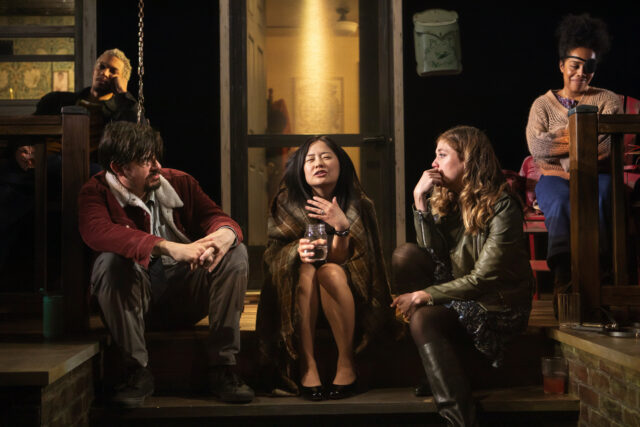
An ensemble cast excels in gorgeous world premiere at the Signature (photo by Monique Carboni)
They gossip about other students, talk about Zoom happy hours, defend the life choices they’ve made, and down glass after glass of spiked jungle juice as the late limo gives them time to explore who they were and who they are, while Emilio stirs the pot with his willingness to brutally criticize the others, loudly pointing out what he believes to be their flaws and their bad decisions. Early on, he shares three German words with Ursula: schadenfreude, torschlusspanik, and kuddelmuddel, which all come home to roost.
They also bring back an old method they used to cut off someone when they were rambling: pretend to snap their neck with a “KRK.” Little do they know how relevant that is, as throughout the 130-minute intermissionless play, every character delivers a monologue from Death, who lurks inside each of them. Their regular voices are joined by an otherworldly echo as Death, lit as if it is glowing from inside the body, directly addresses the audience, offering tidbits about its responsibilities and personal preferences.
The show begins with Death announcing from inside Emilio, “Hello there. You and I, we have met before, though you may not recognize me. People have a tendency to see me once and try hard to forget it ever happened — though that never works — not for very long.”
Later, inside Ursula, Death admits, “You’ll have to pardon me. I come and go. I get shy. Historically, I’ve been rarely met with anything other than fear or anger or regret and, as I’m sure you can imagine, that sort of energy gets . . . taxing. So I chose long ago to abandon any material form of my own and err on the side of the covert. I prefer now to move in and out of whatever vessel inspires me because, when I’m not working, I, like you, am a watcher. I like to watch. . . . I inhabit a body like this if my desire is to speak and, if I have one weakness, it’s for gossip. I suspect you share it. I don’t know what it is, but I find all creatures so interesting, their idiosyncrasies, their interiorities, their secrets. Their stories. These machines of will. And, like any good gossip, I’m always wanting to talk but, you know, finding the right listeners can be a challenge. So you should know you are very special.”
Death serves not only as a character in the play but as a vessel for Jacobs-Jenkins to espouse on the art of theater itself, the playwright as psychopomp. Jacobs-Jenkins, a two-time Pulitzer finalist and Obie winner whose previous works include Girls, Everybody, War, Gloria, Appropriate, Neighbors, and An Octoroon, tells stories that examine humanity’s idiosyncrasies, interiorities, and secrets, in search of an audience of watchers and listeners who are critical to the success of his craft. When Death says, “You should know you are very special,” it is Jacobs-Jenkins telling that to us.
In fact, the playwright continued to make changes throughout the rehearsal and preview process based on audience response; while that is not unusual, it was extensive in this case, and it shows. It’s a masterful production, radiantly directed by Obie winner Eric Ting (The Far Country, Six Apples), who maintains a steady, absorbing pace; you won’t even remember that there’s no intermission, not wanting to leave these characters even for a minute.
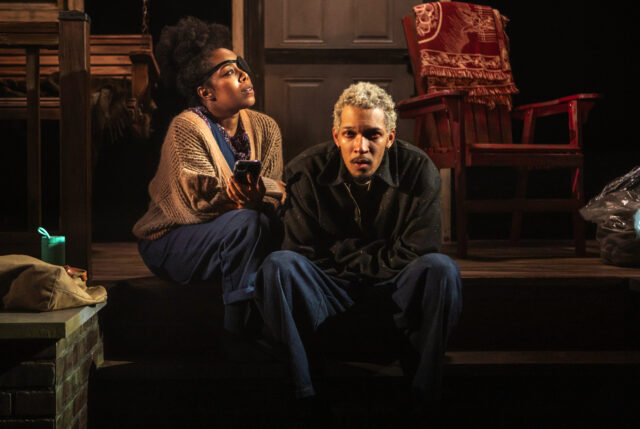
Ursula (Brittany Bradford) and Emilio (Caleb Eberhardt) wonder what could have been in The Comeuppance (photo by Monique Carboni)
Arnulfo Maldonado’s intimate set is practically in your lap, a cozy front porch with a few steps, a swing, a big chair, and wooden railings; a screen door leads into the house. Amith Chandrashaker’s lighting and Palmer Hefferan’s sound keep it all real, as do Jennifer Moeller and Miriam Kelleher’s naturalistic costumes.
Bradford (Fefu and Her Friends, Wedding Band) has a subtle power as Ursula, Flood (Make Believe, Plano) has a sensitive edge as Caitlin, Moreno (72 Miles to Go . . . , Lazarus) carries an impending sense of doom as Paco, Tyo (Regretfully, So the Birds Are, The Far Country) has a firm determination as Kristina, and Eberhardt (Choir Boy, On Sugarland) is a force as the sardonic, insensitive Emilio, who doesn’t know when enough is enough, especially when he’s right. Ursula might have studied mixology, but this group is like a toxic cocktail.
The Brooklyn-based Jacobs-Jenkins was born in DC in 1984, the year before John Hughes’s The Breakfast Club came out. He is the same age as the characters in The Comeuppance, who were rocked by Columbine and whose adulthood essentially began with 9/11, continued with the Iraq and Afghan wars, and then hit a peak with the Covid pandemic, death surrounding them every step of the way. Their youthful innocence is gone, even though a few of them are still trying to hold on to it.
But going back is not the answer, no matter how tenuous the immediate future might be, and just because you were friends in high school doesn’t mean you have to be friends now, in real life or on social media. The twenty years that have passed since prom were good to some and not so good to others, but all five M.E.R.G.E.rs have soul searching to do in order to face the personal demons buried deep within them.
The show is also likely to make you do some soul searching as well. All I know is that, while I wipe away these tears, I’m rethinking going to my next high school reunion.
